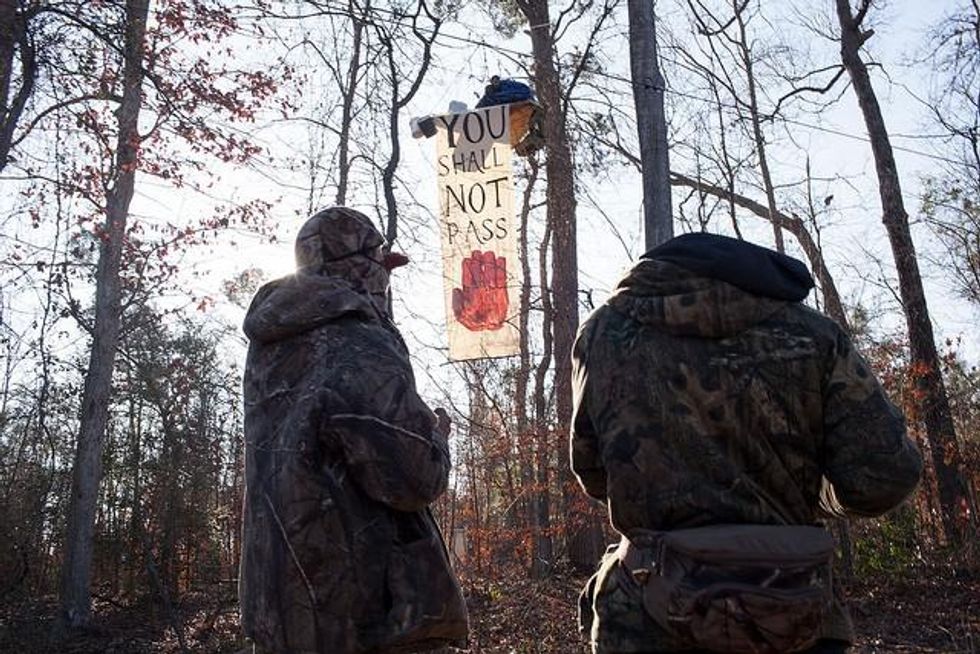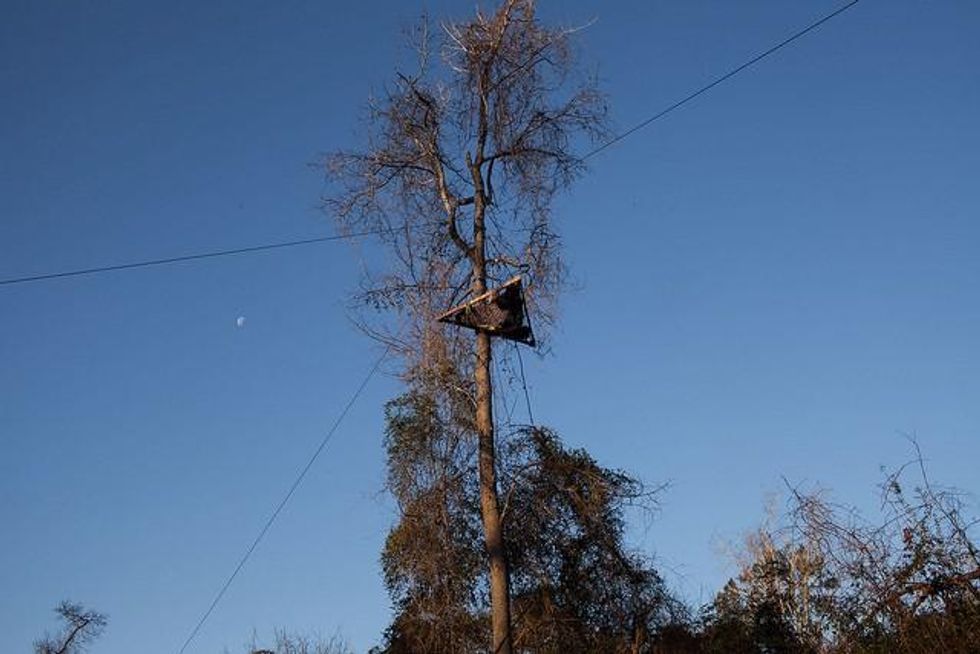Jan 03, 2013

Fresh off the heels of an 85-day tree-sit near Winnsboro, TX, and other correlating actions wherein the group eventually forced pipeline company TransCanada to reroute their Keystone XL pipeline southern leg plans, activists have positioned themselves directly in the pipeline's new path, once again, this time near Diboll, Texas.
"This new site is surrounded by barriers like Highway 59, railroad tracks, and Ryan Lake. With these nearby, blockaders have found a location around which the pipe cannot easily be rerouted," the group stated Thursday.
To accomplish the task, late Wednesday night two blockaders suspended themselves from several tall trees, which have been designated for clearing, 60 feet in the air. The blockaders are balancing on two separate "dump platforms."
The "dump platforms" are held in place by "an unprecedented 80-100 ft perimeter of life-lines" arranged in such a way that if disturbed the blockaders would fall. (See below photo to visualize the blockade method).
"The viability of this blockade depends entirely on the safe conduct of TransCanada and local police forces. They could easily end it by cutting ropes and seriously injuring or killing the tree sitters. Blockaders Audrey and Mike know the risks. They are prepared to stay on their platforms, just big enough to lie down on, indefinitely, to defend their collective home from the expansion of tar sands exploitation that Keystone XL would usher in," the group writes today.
"Protecting the living systems which we're a part of is a moral necessity," said blockader Audrey, who is sitting in a singular tree left in a newly-cleared field. "Extraction of the tar sands is the most destructive project on the continent. It threatens the integrity of the entire biosphere, not to mention the First Nations dependent upon access to clean water, land, and air for the health and food for their tribal communities."
"Institutional methods of addressing climate change have failed us," explained Ron Seifert, a Tar Sands Blockade spokesperson. "Rising up to defend our homes against corporate exploitation is our best and only hope to preserve life on this planet. We must normalize and embrace direct, organized resistance to the death machine of industrial extraction and stand with those like Idle No More who take extraordinary risk to defend their families and livelihoods."

See more photos here.
_______________________
The group released a video of the blockade preparations:
Join Us: News for people demanding a better world
Common Dreams is powered by optimists who believe in the power of informed and engaged citizens to ignite and enact change to make the world a better place. We're hundreds of thousands strong, but every single supporter makes the difference. Your contribution supports this bold media model—free, independent, and dedicated to reporting the facts every day. Stand with us in the fight for economic equality, social justice, human rights, and a more sustainable future. As a people-powered nonprofit news outlet, we cover the issues the corporate media never will. Join with us today! |
Our work is licensed under Creative Commons (CC BY-NC-ND 3.0). Feel free to republish and share widely.
Jacob Chamberlain
Jacob Chamberlain is a former staff writer for Common Dreams. His website is www.jacobpchamberlain.com.

Fresh off the heels of an 85-day tree-sit near Winnsboro, TX, and other correlating actions wherein the group eventually forced pipeline company TransCanada to reroute their Keystone XL pipeline southern leg plans, activists have positioned themselves directly in the pipeline's new path, once again, this time near Diboll, Texas.
"This new site is surrounded by barriers like Highway 59, railroad tracks, and Ryan Lake. With these nearby, blockaders have found a location around which the pipe cannot easily be rerouted," the group stated Thursday.
To accomplish the task, late Wednesday night two blockaders suspended themselves from several tall trees, which have been designated for clearing, 60 feet in the air. The blockaders are balancing on two separate "dump platforms."
The "dump platforms" are held in place by "an unprecedented 80-100 ft perimeter of life-lines" arranged in such a way that if disturbed the blockaders would fall. (See below photo to visualize the blockade method).
"The viability of this blockade depends entirely on the safe conduct of TransCanada and local police forces. They could easily end it by cutting ropes and seriously injuring or killing the tree sitters. Blockaders Audrey and Mike know the risks. They are prepared to stay on their platforms, just big enough to lie down on, indefinitely, to defend their collective home from the expansion of tar sands exploitation that Keystone XL would usher in," the group writes today.
"Protecting the living systems which we're a part of is a moral necessity," said blockader Audrey, who is sitting in a singular tree left in a newly-cleared field. "Extraction of the tar sands is the most destructive project on the continent. It threatens the integrity of the entire biosphere, not to mention the First Nations dependent upon access to clean water, land, and air for the health and food for their tribal communities."
"Institutional methods of addressing climate change have failed us," explained Ron Seifert, a Tar Sands Blockade spokesperson. "Rising up to defend our homes against corporate exploitation is our best and only hope to preserve life on this planet. We must normalize and embrace direct, organized resistance to the death machine of industrial extraction and stand with those like Idle No More who take extraordinary risk to defend their families and livelihoods."

See more photos here.
_______________________
The group released a video of the blockade preparations:
Jacob Chamberlain
Jacob Chamberlain is a former staff writer for Common Dreams. His website is www.jacobpchamberlain.com.

Fresh off the heels of an 85-day tree-sit near Winnsboro, TX, and other correlating actions wherein the group eventually forced pipeline company TransCanada to reroute their Keystone XL pipeline southern leg plans, activists have positioned themselves directly in the pipeline's new path, once again, this time near Diboll, Texas.
"This new site is surrounded by barriers like Highway 59, railroad tracks, and Ryan Lake. With these nearby, blockaders have found a location around which the pipe cannot easily be rerouted," the group stated Thursday.
To accomplish the task, late Wednesday night two blockaders suspended themselves from several tall trees, which have been designated for clearing, 60 feet in the air. The blockaders are balancing on two separate "dump platforms."
The "dump platforms" are held in place by "an unprecedented 80-100 ft perimeter of life-lines" arranged in such a way that if disturbed the blockaders would fall. (See below photo to visualize the blockade method).
"The viability of this blockade depends entirely on the safe conduct of TransCanada and local police forces. They could easily end it by cutting ropes and seriously injuring or killing the tree sitters. Blockaders Audrey and Mike know the risks. They are prepared to stay on their platforms, just big enough to lie down on, indefinitely, to defend their collective home from the expansion of tar sands exploitation that Keystone XL would usher in," the group writes today.
"Protecting the living systems which we're a part of is a moral necessity," said blockader Audrey, who is sitting in a singular tree left in a newly-cleared field. "Extraction of the tar sands is the most destructive project on the continent. It threatens the integrity of the entire biosphere, not to mention the First Nations dependent upon access to clean water, land, and air for the health and food for their tribal communities."
"Institutional methods of addressing climate change have failed us," explained Ron Seifert, a Tar Sands Blockade spokesperson. "Rising up to defend our homes against corporate exploitation is our best and only hope to preserve life on this planet. We must normalize and embrace direct, organized resistance to the death machine of industrial extraction and stand with those like Idle No More who take extraordinary risk to defend their families and livelihoods."

See more photos here.
_______________________
The group released a video of the blockade preparations:
We've had enough. The 1% own and operate the corporate media. They are doing everything they can to defend the status quo, squash dissent and protect the wealthy and the powerful. The Common Dreams media model is different. We cover the news that matters to the 99%. Our mission? To inform. To inspire. To ignite change for the common good. How? Nonprofit. Independent. Reader-supported. Free to read. Free to republish. Free to share. With no advertising. No paywalls. No selling of your data. Thousands of small donations fund our newsroom and allow us to continue publishing. Can you chip in? We can't do it without you. Thank you.